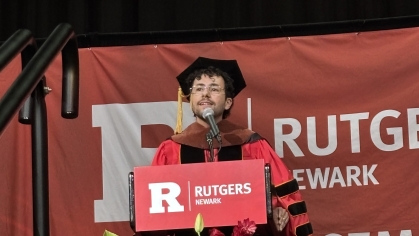Students Celebrate Shared Experiences at Affinity Celebrations
Rutgers-Newark’s commencement ceremony was celebrated by thousands at the Prudential Center last week, and professional schools on campus–such as the law school and business school–hold their own graduation ceremonies. But smaller groups that are bound together by shared cultural or social identities mark the milestone in their own way.
Called “affinity celebrations,’’ the annual events are organized by Rutgers-Newark’s Intercultural Resource Center, part of the Division of Student Affairs.
“The beauty of affinity celebrations is that our students organize them; they celebrate each other while considering the traditions of culture and identity,’’ said Gary Santos Mendoza, director of the Intercultural Resource Center. “My team, in collaboration with our students, creates the vision, connects with their peers on what is crucial for them, and executes the magic that is these events. Spaces of celebration for our students are vital because they want to bring in all who impacted their educational journey to celebrate their accomplishments in the Rutgers University-Newark community."
At Rutgers-Newark, there are three annual affinity ceremonies: Rainbow Graduation, which celebrates LGBTQ students, Undocu Graduation, a ceremony for undocumented immigrant students, and Rites of Passage for Black and Latinx students.
More intimate than an arena commencement, which the students also attend, affinity ceremonies are a chance for students to mark the occasion with friends, family and “chosen family”-- people who supported them during challenges that might be specific to their group– and reflect on shared memories.
At the Rainbow Graduation, held at the Paul Robeson Campus Center earlier this month, the decor was in keeping with the theme. Graduates received rainbow stoles to wear with their Rutgers regalia, which they donned for the campus-wide commencement.
Santos Mendoza explained the origins of Rainbow ceremonies, which are held nationwide. Also called Lavender Graduation, the tradition was started in 1995 by Ronni Sanlo, a Jewish Lesbian, who was denied the opportunity to attend the graduations of her biological children because of her sexual orientation.
Sanlo, who was Director of Gay and Lesbian Programs at the University of Michigan, organized the event as a way to support and celebrate queer students. Today, more than 175 schools hold similar ceremonies.
Rainbow Graduation at RU-N provided an opportunity for participants to recount stories of self-discovery and take a nostalgic look back at shared experiences, such as campus drag shows and the ubiquitous rainbow cupcakes served at LGBTQ events.
Student speaker Rohit, who earned his masters from the School of Criminal Justice, learned to be proud of his queer identity at Rutgers-Newark. “I grew up in a culture where being queer wasn’t respected, in fact it was frowned upon. But I knew I was unique, that I was meant to be standing out,’’ he said.
After joining the LGBTQ Raiders peer-to-peer program, Rohit gained confidence. “I felt a sense of relief that I could name what I’m feeling,’’ he said. The experience instilled a sense of freedom and self-assurance that marked his education at Rutgers-Newark.
At the Undocu Graduation Ceremony, the Monarch butterfly, a symbol of undocumented immigrants, represented migration and transformation and appeared on stoles awarded to graduates. Student speaker Dayana Perla Lemus, whose family fled El Salvador for a new start in the U.S., recounted obstacles she faced because of her immigration status.
“I was often told higher education wasn’t for me because I was undocumented. Yet I continue to demonstrate to those people that just because I lack the legal status, I’m not unworthy to educate and accomplish the impossible,’’said Lemus, who received her degree from the School of Criminal Justice. “At Rutgers Newark, I found a community that took me under their wing. There was unconditional support from Rutgers Immigrant Student Empowerment (RISE), which advocated non- stop for what is needed and continues to be needed. “
She added, “Don’t let anyone ever tell you you can’t accomplish something because of a little piece of paper. Your undocumented status does not define who you are or what you’re capable of accomplishing.”
Students at the ceremony, held at Ruth Bader Ginsburg Hall, awarded Rutgers-Newark Chancellor Nancy Cantor with an Undocu-Ally Award, which, going forward, will be named the Nancy Cantor Trailblazer award and presented annually to leaders who provide unconditional support to undocumented students.
Cantor gave a heartfelt speech that served as an expression of gratitude and a rallying cry.
She praised the work of RISE. “You have no idea what a privilege it is for someone like me to see what RISE has grown into, to see what you have done,’’ she said.
“There’s not enough change happening in the undocumented world, we know that. But there can be and there will be if we all keep at it together. And when you get your degrees, you will walk across that stage and into that room, and ultimately you’ll get the righteous path to citizenship that everyone deserves,’’ she said.
“It won’t be a linear path and it won’t be easy, but you’re used to it not being easy,’’ she said. “We will get there because the talent of immigrants has made this country. Nothing happens without diverse immigrant communities that build, create and innovate and hold each other up and don’t take anything for granted.’’
Student Eboni Bugg, a major in Public Affairs and Administration and an Honors Living-Learning Community Scholar, summed up the significance of the Rites of Passage Ceremony, where Black and Latinx students were draped with Kente cloth stoles at Ruth Bader Ginsburg Hall.
"Celebrations like the Rites of Passage on campus serve as powerful reminders of unity, resilience, and achievement within our community. They provide an opportunity for individuals to reflect on their personal journeys, celebrate their successes, and feel supported by their peers as they embark on new chapters in their lives,’’ she said. “Such celebrations foster a sense of belonging and empowerment, essential for personal growth and academic success."
Corlisse Thomas, Senior Vice Chancellor for Student Affairs, invited the graduates to follow the example of leaders who are recognized through on-campus tributes. They include actor and civil rights activist Paul Robeson and Frederick Douglass, for whom the athletic field is named. The famed orator and abolitionist once spoke at a Black church that stood where the field is now.
Thomas praised Hilda Hidalgo, founder of La Casa De Don Pedro, New Jersey’s largest advocacy and support organization for Latinx residents, and Supreme Court Justice Ruth Bader Ginsburg. Both women taught at RU-N.
“One of the things I love about Rutgers-Newark is that on this campus, we walk among giants,” said Thomas. “And the example set by those giants has supported you and prepared you. I don’t think it’s an accident that our buildings are named after people who have changed the world and done so in a way that require community. That is the defining characteristic of Rutgers University—Newark. That’s what we hope was embedded in you. Community. That is what’s required.’'


